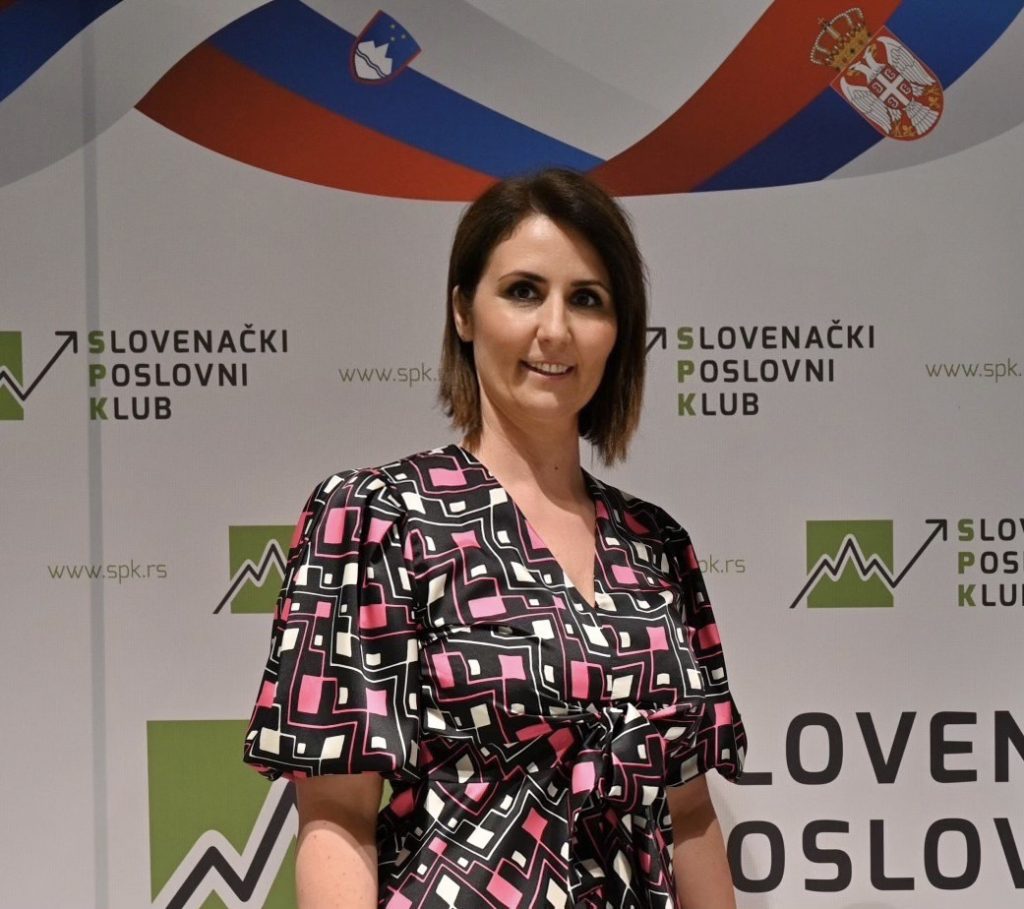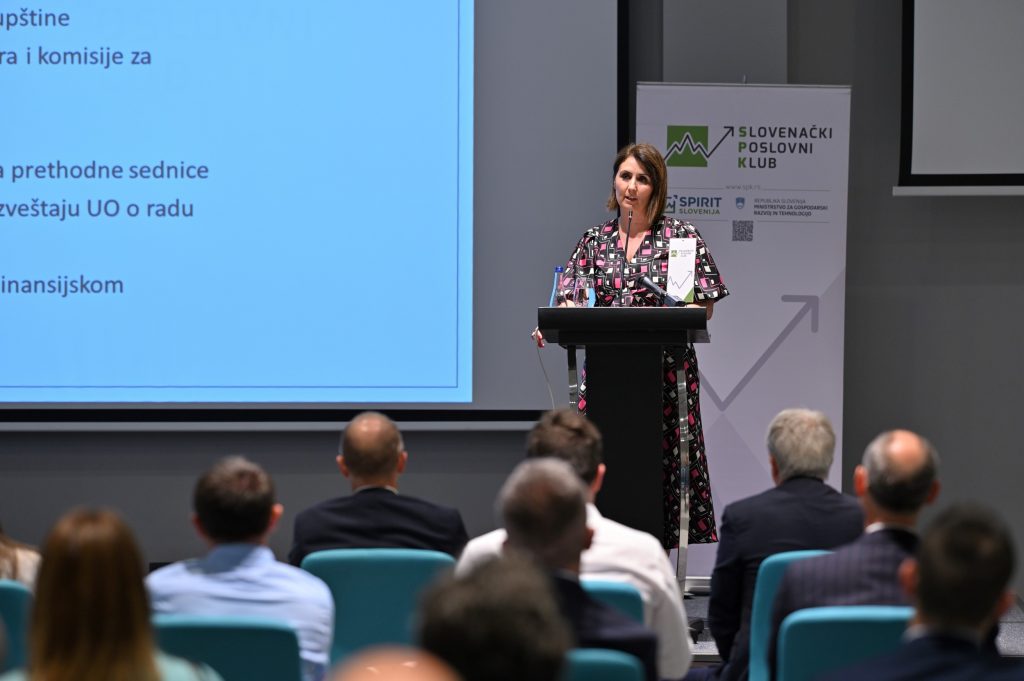Serbia is the second country in terms of the size of Slovenian investments.
This year, the Slovenian Business Club celebrates its 18th anniversary. We interviewed Danijela Fišakov, president of the Slovenian Business Club, for this year’s issue of InFocus Slovenia. In the interview, Ms Fišakov says that being a reliable partner for 18 years to its members and the two countries is a success worth mentioning.

“Back in 2003, representatives of several Slovenian companies, which were active in Serbia, initiated the establishment of a service that would offer assistance to Slovenian and Serbian business people, from legal to logistical, and help them to make new contacts. The Slovenian Business Club was the ideal solution for this. Of course, we had to overcome a lot of initial problems, but the dedicated work of both our staff and members resulted in the SBC growing into a healthy, strong and capacious organization that represents a kind of bridge between the economies of the two countries,” Ms Fišakov added.
What were your guidelines when you founded the club and has the Club managed to achieve its goals over the past years?
At the time of the SBC’s inception, I was just beginning my career. To date, a lot has changed for the better in the Serbian business environment. Nevertheless, the reasons why the SBC was founded are still the same today, with some variations. The SBC was created with the goal of helping Slovenian business people to find their way on the Serbian market more easily, to exchange experiences and overcome the difficulties they encountered by breaking through the then rather harsh and poorly regulated business environment.
Over time, the participation of Serbian companies in the membership began to gain importance. First and foremost, these were companies that cooperated with the representatives of the Slovenian economy here, and then the companies who wanted to be representatives of the Serbian economy in Slovenia. Today, Serbian companies and third-country companies make up almost a third of the SBC’s membership. The diversity of membership constantly creates a variety of challenges for the Club, which mission is to create success stories. All its activities are aimed at creating benefits for members.
In recent years, the number of Serbian companies in Slovenia has visibly increased, which contributes to a greater bilateral economic activity.
How would you rate the cooperation with the Slovenian and Serbian state bodies, and how with other bilateral chambers and business associations?
Thanks to its impeccable reputation and quality work, the SBC complies with high standards and constantly sends out a clear message that the organization is trustworthy and reliable. As an organization that helps develop cooperation between the economies of Slovenia and Serbia, the SBC does enjoy support from state institutions in both countries. This support is very important because we are thus in a position to positively influence business relations in both Slovenia and Serbia, that is, to launch initiatives and get support. We are present at a number of important events where we promote our members and ask questions on their behalf. In our daily work, we cooperate with various state institutions and in most cases, we are satisfied with that cooperation. State institutions recognize the cooperative importance of Slovenian companies in Serbia and respond to invitations from the SBC. The information we receive from state institutions is always timely and useful.
We cultivate a traditionally good relationship with other foreign chambers and clubs, which was especially evident in the, unfortunately still current, extraordinary circumstances caused by the COVID-19 pandemic. We exchange information and help each other, and we have continued to organize joint events live or online.
We can see that Slovenia and Serbia have excellent economic relations. In what areas do you see a chance for improvement?
Slovenian-Serbian economic and political relations are traditionally good and have been constantly developing. Slovenia has been diligently trying to contribute to and accelerate Serbia’s accession to the EU. Serbia, as the only country from the former Yugoslavia, has a branch of its chamber of commerce in Ljubljana.
The volume of trade between the two countries shows a continuous and significant upward trend. The data show that in 2020, the trade reached almost 1.6 billion euros and that in the first seven months of this year alone, it already amounted to 1 billion euros. The value of trade could be much higher and more significant in the future because there are large, still completely untapped, potentials and capacities for that on both sides. The information technology, agriculture, construction and environmental sectors are still far from reaching their maximum in terms of cooperation.

In recent years, Serbia has proven to be a very interesting market for investment. How much are Slovenian companies interested in entering Serbia and vice versa?
According to the data collated by the National Bank of Serbia, in 2020, out of the total 3 billion euros of FDI in Serbia, almost 500 million euros of investments came from Slovenia, which puts Slovenia in the first place on the list of the biggest investors in Serbia, except for investments of third countries made via the Netherlands. At the same time, the constant growth of trade between the two countries shows a strong economic connection between them. Many good Slovenian companies and business people are active on the Serbian market. In recent years, the number of Serbian companies in Slovenia has visibly increased, which contributes to a greater bilateral economic activity.
In recent times, some Serbian companies have taken over Slovenian companies that have a long business tradition. For example, Agromarket from Kragujevac bought Semenarna from Ljubljana.
It gives me great satisfaction to say that the interest of both Slovenian and Serbian companies in investing in the respective markets has been constantly growing.
I hope that this state of emergency will pass as soon as possible and that we will come out of it as healthy people and our economies as vital and functional.
What problems have your members been facing in Serbia and how can the Serbian government improve the investment climate?
Serbia is already a very attractive country for investing, especially for Slovenian investors, and its business environment has become more orderly and business-friendly in recent years. It is very important that the state does not stop with the ongoing reforms at all levels, but continues with their practical implementation. The problems that befell it due to the pandemic are not local and specific but global and cannot be a possible excuse to stop.
The imperative of the future Serbian state economic policy must be focused on simplifying tax procedures in order to reduce the burden on businesses, reduce bureaucracy and increase the efficiency of public administration, along with the implementation of intensive digitalization. Transparency is the most effective anti-corruption tool. There is always too much corruption, but simplifying procedures can never be too much of. The Government must be constantly in touch with businesses, participate in the dialogue with them and respect their needs and idiosyncrasies.
How much has the Covid-19 induced crisis, which has been going on for almost two years, affected companies both in Serbia and in Slovenia?
The trade between the two countries was substantial in 2020 and suffered a minimal decline compared to 2019 when it amounted to a little more than 1.6 billion euros. It is expected that in the future, when the epidemiological conditions improve, the possibilities for cooperation between the two countries in all segments will be even greater.
From the very beginning of the epidemic on the global level, tourism, hotel industry, catering, a large part of transport and event organization have been affected the worst, i.e. all those economic sectors whose functioning directly depends on the fluctuation of people. However, countries are slowly reopening to foreign tourists. Great potential in tourism will soon come to the fore, given the fact that Slovenia is one of the favourite tourist destinations for Serbs, and that Slovenes participate with as much as 5% of the total number of foreign tourists in Serbia.